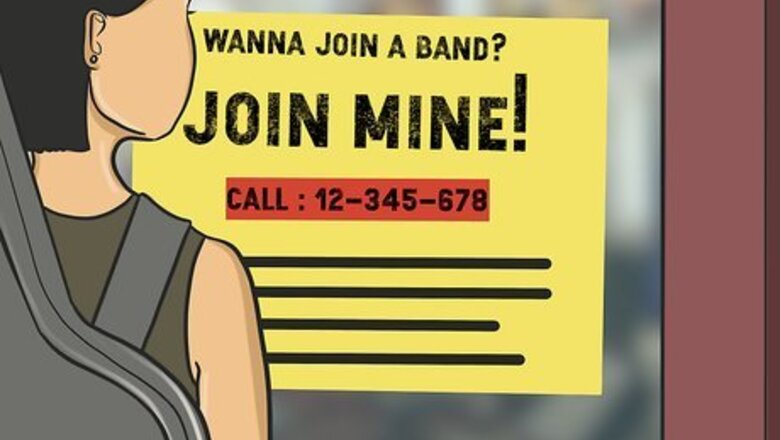
views
Finding People to Play With

Look for ads and notices in music stores, venues, and rehearsal rooms. This is the best way to find local musicians who are actively searching for people to join their band. If you don’t see any posted ads in these places, check back again on a regular basis to see if any new ads have been put up. For example, make it a point to pop into the same local music store every weekend to see if anybody has posted a notice for a musician to join their band. Try to go to as many local places as possible. Your area probably has a lot of venues for bands to play in, so check all of them out to see if these bands are looking for new members.
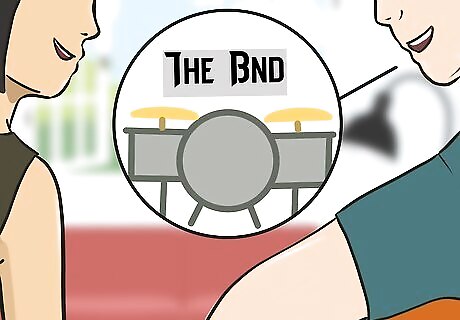
Join a group music lesson or class to network with other musicians. Talk to other participants in the class to see if they’re either in a band or know people in one. This is one of the most direct and simple ways of expanding your music network in your local area, which is very helpful for finding other musicians. For best results, sign up for a course in the musical instrument that you want to play in the band. For example, if you want to join a band as a drummer, take a class on drumming. Enrolling in music classes also has the added benefit of helping you be a better musician down the line.

Go to open mic nights and jam sessions to meet other fans of music. They may not be members of a band who are seeking a new bandmate, but there’s a chance they’re friends with people in a band. Going to open mic nights is also the best way to meet people in your local music scene without having to actually play an instrument.
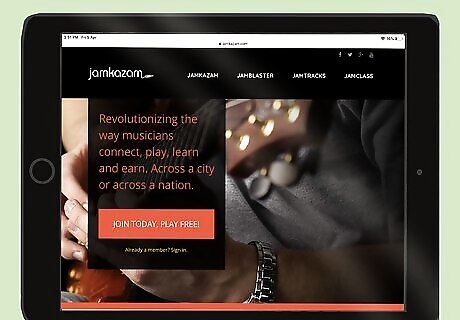
Use websites that post listings for bands that are looking for members. There are a variety of websites where you can either peruse different bands’ listings or post your own ad for bands to look at. Going online will also allow you to narrow your search based on your specific preferences or requirements. For instance, if you’re only interested in joining a punk rock band, you can narrow your search to only those bands that play punk rock music. Some of the best websites to use include JoinMyBand, Gumtree, JamKazam, and BandMix. You may also find musicians looking for people to join their band on social media. Facebook and Twitter are the most common social media platforms to look on, but musicians also tend to be active on Soundcloud, Bandcamp, and Reverbnation.

Upload videos of yourself playing music online. In your videos, mention that you’re actively looking for a band to join. This way, other musicians will be able to see your musical talent before they even meet you and determine whether you’d be a good fit for their band. YouTube is the best website for you to post your videos, but you may also have some luck sharing them to Facebook as well.
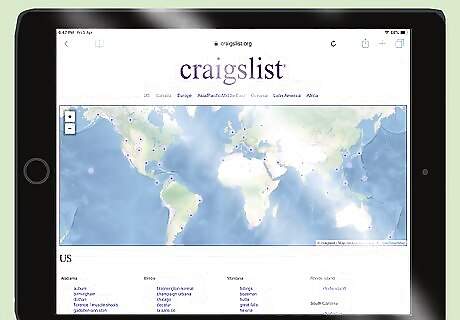
Post your own classified ads that say you’re looking to join a band. If there are any bands out there that are actively looking for new members, they may seek to add you to their lineup if they come across your ad. Craigslist is by far the most popular site people use for posting classified ads.
Developing Your Musical Talent
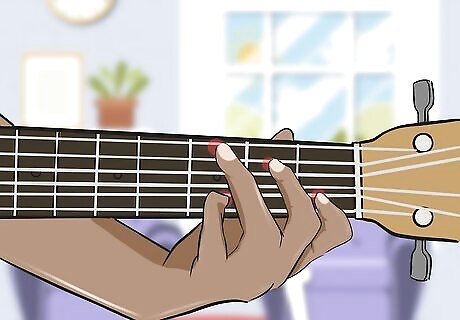
Study chords and chord progressions, especially if you’re a guitarist. A lot of modern songs are crafted around a few key chords, so having a good knowledge of chords and chord progressions is a great way to be a better songwriter. It also makes you better able to contribute and follow along during jam sessions. For example, in the key of C major, a very common chord progression is C-G-Am-F. These chords are played in sequence one after the another to create a harmonious melody. E Minor and A minor chords are the best to start with, since they can go into different sets and scales. For example, you can play E minor to an A minor, and the to a B7.

Familiarize yourself with a few different musical styles. If your goal is to join a band no matter what genre of music they play, then learning how to play more than one genre is the best way for you to expand your “marketability.” Learn how to play 1 or 2 of the most popular songs in each genre. For instance, learn how to play a popular country music song, a popular death metal song, and a popular pop song. This will at least make you familiar with some of the common chords and progressions in these different genres. Try to learn new songs constantly. The more songs you know, the less you'll have to learn when joining a new band. It may also be helpful to learn how to play different instruments, as well. You’ll be more marketable if you can play drums as well as guitar. At the same time, you may instead want to focus on being the best at just one instrument.
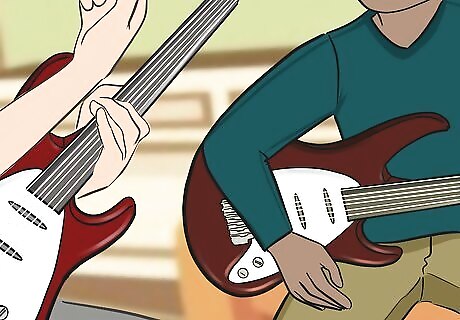
Hire a music teacher to help you learn from a professional. If you haven’t been playing music for a long time, learning from an experienced teacher is the best way to develop your skills quickly and efficiently. A music teacher will also be able to guide your learning in the right direction for your goal of joining a band (instead of, say, becoming a classical musician). You can find music teachers in your local area by searching for them online. You may also be able to find them at a local music store or venue.
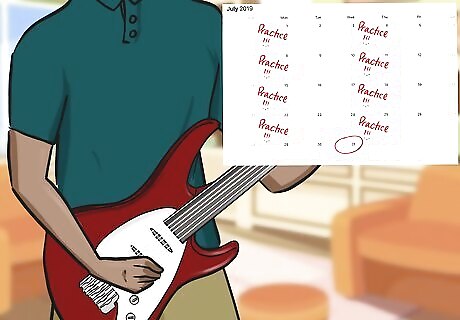
Be sure to practice on a regular basis to keep your skills sharp. Make time for yourself to practice your instrument on a daily basis and commit to playing during that time. During these practice sessions, review the stuff you’ve already learned and try to learn something new as well. For example, if you already know how to play a certain song, practice playing that song during your practice session. Then, work on learning to play a different song by the same artist.
Being a Great Band Member
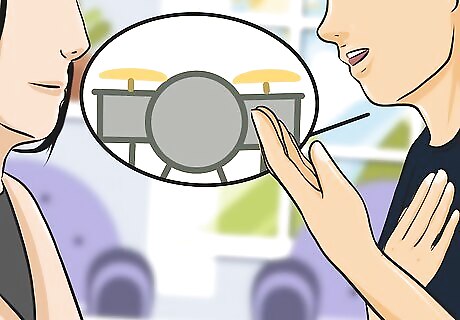
Be upfront about your goals and expectations before you join a band. Some bands may only be looking for someone to fill in for one of their members part-time, while others may be looking for a new full-time member. Be clear about your own goals and expectations for your membership in the band to avoid anyone being misled. For instance, if you’re an experienced musician and you only want to play with other experienced players, let the other band members know before you decide whether to join the band. You could say something like: “I just want to make it clear that I want to join a band as part of a musical career. If this band is more about just having fun, maybe I wouldn’t be a good fit for you.” If you post any ads or videos looking for a band to join, include this information as well.
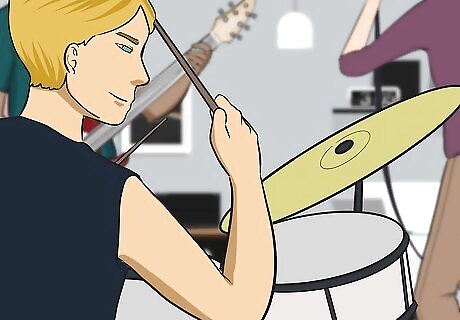
Take your commitments to the band seriously once you join. At the very least, you should be as serious about the band as the other band members are. They are devoting time and energy to the group, so you need to do the same in order to make your membership in the band successful.
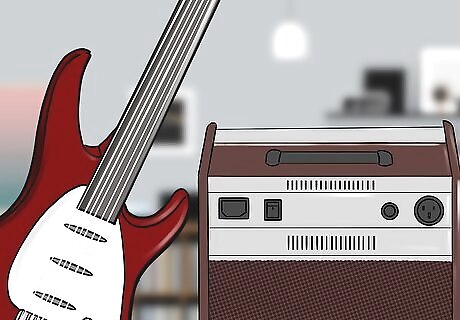
Have your own instrument and equipment to play with. Avoid having to rely on other band members to provide the things you’ll need to play. This may also include any other equipment you will need when performing or recording, such as an amplifier, effects pedals, and so on. Note that some of this equipment can be pretty pricey. If you’re on a budget, or your band isn’t trying to “make it big,” you may want to invest in some used equipment and instruments from a local thrift store or resale music shop. If you are a lead vocalist, you should consider buying at least a 4-channel P.A. system. Take good care of your instrument, especially if you're a guitar player. Always keep your guitar in a case or cover, and keep it out of direct sunlight. Also, make sure to avoid severe heat, cold, and moisture when you store your instrument. Make sure your guitar is cleaned properly before putting it away. Wipe down all the strings, and make make sure there's no finger oil along the face, top, or sides of the guitar. After joining a new band, it doesn't hurt to keep spare strings, batteries, drumsticks and guitar picks in your gig bag. The first time your guitarist forgets one of these items or the drummer breaks a stick, you'll be a hero.

Be willing to learn from your mistakes and have fun. Jamming and writing songs is often a trial-and-error process, so it will require some humility and willingness to learn from others to be good at it. Always remember, you won’t be any fun to play with if you’re not having fun yourself! For example, if a member of the band offers some constructive criticism of how you’re playing, say something like: “Thanks! I’m always looking for ways of improving my playing.”
















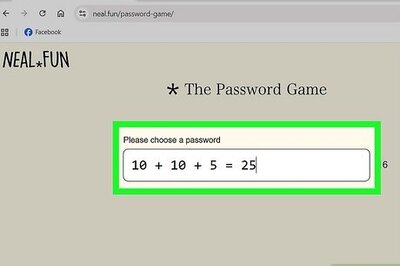


Comments
0 comment